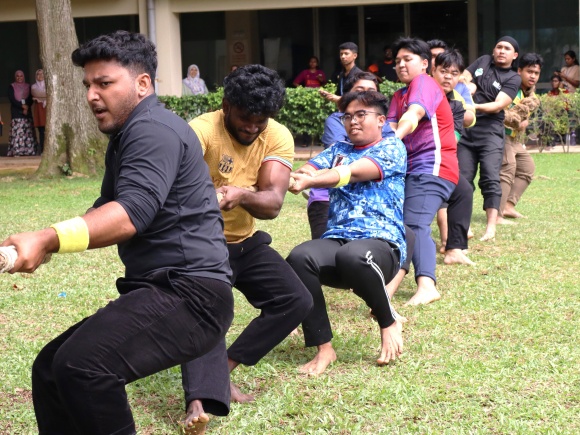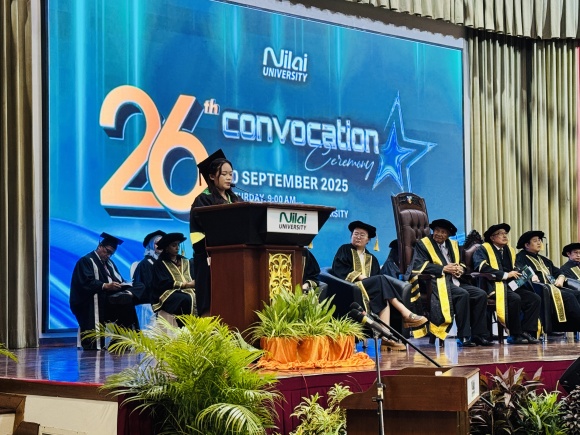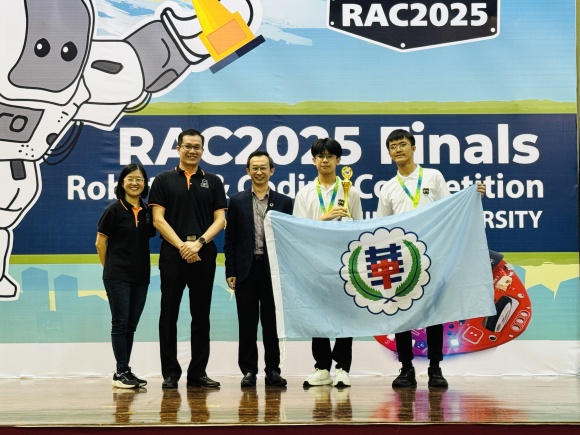THE BASICS TO BECOMING A LICENSED AIRCRAFT MAINTENANCE ENGINEER
Are you intrigued by the mechanism of aircraft? Would you be awed and mesmerized when you watch a plane takes off?
“A pilot is competent in flying an aeroplane. On the other hand, a licensed aircraft maintenance engineer understands the ins and outs of a specific aircraft,” mentioned Ramanathan Meyyappan, a lecturer.
“To become a Licensed Aircraft Maintenance Engineer, students should be well-versed in technical knowledge and also be aware of the human factors. Human factors is a core course in the Diploma of Aircraft Maintenance Engineering. We teach the impacts of environmental stimulants on the human workforce,” stressed Dr Louie Longasa Timajo, Programme Co-ordinator of the Department of Aircraft Maintenance at Nilai University.
.jpg)
Human Factors: A basis to the top 5 soft skills
“Human factors are closely monitored and managed in the airlines. Body temperature is at the lowest in the wee hours of 4:00 am to 6:00 am. Concentration is also at its lowest. As such, lighter tasks will be assigned,” Selvarajah A/L Chelliah, Senior Instructor quoted the Circadian Theory.
“A human body has its limits. We teach students to recognise fatigue, stress, and discretely take necessary precautions at work,” added Ramanathan.
“There are nine topics covered under the Human Factors Course, some topics are social psychology, the physical environment, communication and more,” explained Suresh Kumar Subramaniam, another lecturer.
“Communication amongst team members is vital. We encourage students to hone skills that will enable them to be better team players, such as discipline, respect, accountability, clear communication and good listening skills. These may be simple skills, but if students master these skills, they will be invaluable team members, and ultimately, they become true leaders,” emphasised Dr Louie.
“Apart from the soft skills mentioned earlier, we also prepare our graduates with sound engineering and hands-on skills. The knowledge and skills gained will prepare them well for operations, maintenance as well as troubleshooting in a professional environment,” said Dr Louie.
According to Dr Louie, the Diploma in Aircraft Maintenance Engineering offered by Nilai University incorporates the syllabus of European Aviation Safety Agency (EASA). Students will have an option to either specialise in Category B1.1 (Aeroplane Turbine) or B2 (Avionics). “Students will select which category to specialise in semester two in the first year,” added Selva.
“Most airlines and maintenance, repairs and overhaul companies (MROs) prefer students with either B1.1 or B2 basic qualifications,” concurred Ramanathan.
Under B1.1 category of EASA syllabus, there are thirteen modules for students to complete and an additional five modules for the B2 category basic license.
5 Core Technical Courses
The five fundamental technical courses which form the basis for the overall programme are;
- Basic Aerodynamics
- Mathematics
- Physics
- Electronics and Electrical Fundamentals
- Maintenance Practices
Students from science and non-science background could enrol in the Diploma of Aircraft Maintenance Engineering. In the first semester of year one, students will learn basic concepts and theories of aerodynamics.
Basic Aerodynamics
“We will teach students about the International Standards Atmosphere, which explains the relationships between temperature and pressure in varies altitudes,” mentioned Ramanathan. In this course, students will learn about the 4 forces of flight and several types of drags. Ramanathan further stressed students who could comprehend these concepts and methods, will be aware of the cause and consequences. “For instance, if a wheel is out of alignment, drag may cause it. Dust particles on the surface of an aircraft cause skin friction draft, resulting in a domino effect such as higher fuel consumption etc,” stated Ramanathan.
Mathematics and Physics
The second and third courses in the Diploma of Aircraft Maintenance Engineering will be Mathematics and Physics. Suresh illustrated that these two courses are basic and therefore, students without science background could cope with the syllabi easily. In Mathematics, the curriculum will cover necessary conversion calculations such as from kilometres to meters and pounds to litres.
“We also teach students to calculate torque loading which could be applied on the job,” added Selva.
“In Physics, we explain the basic laws and principles such as Newton’s Law, Pascal’s Law and Bernoulli Principle. Once students grasp the effects of these laws, we will explore and discuss the practical effects on aircraft. For example, the Bernoulli’s principle deduced how an aircraft gains lift. Later, these syllabi in Physics will be applied in other advanced courses such as Aircraft Hydraulics and Pneumatics, and Digital Techniques and Electronics,” emphasised Ramanathan.
Electronics and Electrical Fundamentals
Students pursuing the Diploma in Aircraft Maintenance Engineering will also learn about Electronics and Electrical Fundamentals. “We will conduct lessons on basic electrical and electronics theory, and for practical, there is an avionic workshop. Students will construct numerous types of circuits, for example; series circuit, and parallel circuits. Also, we will teach students about the applications and functions of fuses, circuit breakers, batteries, inverters, motors, generators, transformers and transistors, mentioned Selva.
These skills and knowledge in electronics and electrical fundamentals are essential as aircraft are powered by batteries, inverters, ground power unit and generators. In the future, students will still apply this knowledge when they undergo a specified manufacturer’s course to become a qualified type-rated engineer.
Maintenance Practices
Under the course Maintenance Practices, the syllabi will include the basic tools: hand and machine tools. In the workshops at Nilai University, students will have hands-on experience to use these tools. Students must familiarise with these tools and develop hands-on experience.
“We will also, teach basic daily procedures in aircraft maintenance such as towing, moving the aircraft from one place to another, jacking, fuelling, and parking. These are the day-to-day activities, procedures and precautions to be followed by the aircraft engineers. Different types of maintenance practices will be taught. We constantly remind students to refer to relevant manuals at all times. Proper maintenance ensures aircraft to be airworthy and safe,” further explained Ramanathan.
In the final year, students will also undergo a 6-month on-the-job training with Air Asia and Air Asia-X. Upon receiving the Diploma in Aircraft Maintenance Engineering, he/ she will have an option to work as an Aircraft Maintenance Technician or progress to the Advanced Diploma in Aircraft Engineering Technology and BEng (Hons) in Aircraft Engineering awarded by Kingston University, in the UK. The Advanced Diploma and Honours Degree could be completed in just one year.
However, to comply with the requirements by EASA Part 66 regulation and the aviation authority, graduates should work on the aircraft, the engine and the avionic systems for five years in an airline or MRO before applying for their EASA Part 66 Basic License (Category B1.1 or B2).
After which, the respective airline or MRO will send selected qualified aircraft licensed professionals for a manufacturer’s type rated course. Then, the Aircraft Licensed Engineers will be issued a Personal Authorisation Certificate (PAC) which certifies him/ her to sign the Certificate of Release Service (CRS) for aircraft airworthiness. Some of Nilai University students have successfully achieved this professional position within eight years after graduating.
Nilai University offers up to 100% scholarship to well-deserving students. Find out about the seven types of scholarships available. Nilai University’s education counsellors and experienced lecturers will guide, access and assist you in applying for a scholarship. Nilai University is open daily except on public holidays. Please call 06-850 2308 for an appointment or click on www.nilai.edu.my or visit our campus in Nilai.
Read Online: PressReader.com



